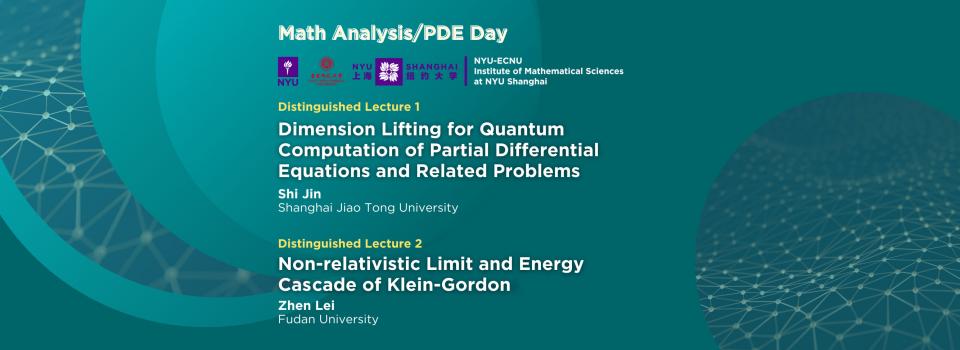
Math Analysis/PDE Day Distinguished Lecture 1:
Dimension Lifting for Quantum Computation of Partial Differential Equations and Related Problems
Shi Jin, Shanghai Jiao Tong University
Quantum computers have the potential to gain algebraic and even up to exponential speed up compared with its classical counterparts, and can lead to technology revolution in the 21st century. Since quantum computers are designed based on quantum mechanics principle, they are most suitable to solve the Schrodinger equation, and linear PDEs (and ODEs) evolved by unitary operators. The most efficient quantum PDE solver is quantum simulation based on solving the Schrodinger equation. It will be interesting to explore what other problems in scientific computing, such as ODEs, PDEs, and linear algebra that arise in both classical and quantum systems, can be handled by quantum simulation.
We will present a systematic way to develop quantum simulation algorithms for general differential equations. Our basic framework is dimension lifting, that transfers nonlinear PDEs to linear ones, and linear ones to Schrodinger type PDEs. For non-autonomous PDEs and ODEs, or Hamiltonian systems with time-dependent Hamiltonians, we also add an extra dimension to transform them into autonomous PDEs that have only time-independent coefficients, thus quantum simulations can be done without using the cumbersome Dyson’s series and time-ordering operators. Our formulation allows both qubit and qumode (continuous-variable) formulations, and their hybridizations, and provides the foundation for analog quantum computing.
Biography
Shi Jin is the Director of Institute of Natural Sciences, and Chair Professor of Mathematics, at Shanghai Jiao Tong University. He obtained his BS degree from Peking University and his Ph.D. from University of Arizona. He was a postdoc at Courant Institute, New York University, an assistant and associate professor at Georgia Institute of Technology, and full professor, department chair and Vilas Distinguished Achievement Professor at University of Wisconsin-Madison, Chair of Department of Mathematics at Shanghai Jiao Tong University.
He also serves as a co-director of the Shanghai National Center for Applied Mathematics, and the director of Shanghai Jiao Tong University Chongqing Artificial Intelligence Institute.
He received a Feng Kang Prize of Scientific Computing in 2001. He is an inaugural Fellow of the American Mathematical Society (AMS) (2012), a Fellow of Society of Industrial and Applied Mathematics (SIAM) (2013), an inaugural Fellow of the Chinese Society of Industrial and Applied Mathematics (CSIAM) (2020), and an Invited Speaker at the International Congress of Mathematicians in 2018. In 2021 he was elected a Foreign Member of Academia Europaea and a Fellow of European Academy of Sciences.
His research interests include kinetic theory, hyperbolic conservation laws, quantum dynamics, uncertainty quantification, interacting particle systems, computational fluid dynamics, and quantum computing. He has published more than 220 research papers.
Math Analysis/PDE Day Distinguished Lecture 2:
Non-relativistic Limit and Energy Cascade of Klein-Gordon
Zhen Lei, Fudan University
We will present our recent studies on nonlinear Klein-Gordon equations. The first part is on the non-relativistic limit. Both the convergence rate and the requirement on the regularity of initial data are both sharp. The second part is on the energy cascade theory. Energy moves from discrete modes to continuous modes. The mechanism, and the lower and upper bounds of energy transfer will be presented.
Biography
Professor Zhen Lei is currently Professor and Dean of School of Mathematical Sciences at Fudan University, Vice President of the China Society of Industrial and Applied Mathematics, and Director of Fudan Center for Applied Mathematics. He received his Ph.D. in mathematics from Fudan University in 2006. Since 2011, he has been Ph.D. Advisor and Professor of the School of Mathematical Sciences at Fudan University. He was Postdoc at Caltech in 2007 and became the Princeton IAS member in 2014. Over the years he has held various visiting positions at Peking University, Penn State University, Courant Institute of Mathematical Sciences in NYU, California Institute of Technology, the Institute of Mathematical Sciences in CUHK, Department of Mathematics in NUS, Brown University, and Harvard University.
Professor Lei’s research focuses on the mathematical theory of nonlinear wave and elastodynamic equations, Navier-Stokes equations and related PDEs arising in fluid dynamics. He introduces the concept of strong null condition and proves the global well-posedness of small amplitude solutions for incompressible elastodynamic systems in two dimensions.
Professor Lei’s awards and honors include the Second Prize of the National Natural Science of China (2020), the XPLORER Prize (2022), the Shanghai Science and Technology Elite (2022), the Shiing Shen Chern Mathematics Award (2023) and etc. He has delivered more than 10 plenary talks at various international conferences. His work is highly regarded by a large number of leading mathematicians and has also made a wide impact among the peers. He is now the Deputy Editors-in-Chief of Chinese Annals of Mathematics, a Board Member of Discrete and Continuous Dynamical Systems, Fundamental Research, Communications on Pure and Applied Analysis, Annals of Applied Mathematics, etc.
Seminar by the NYU-ECNU Institute of Mathematical Sciences at NYU Shanghai
This event is open to the NYU Shanghai community and Math community.


